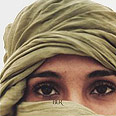

Julian Schnabel, an American Jew born three years after the creation of Israel, views four decades of Palestinian history through Palestinian eyes in "Miral," which screened Thursday at the Venice film festival.
"Obviously it's a Palestinian story, but it's very important that an American Jewish person tell a Palestinian story," Schnabel, 58, said on a stop in Paris en route to Venice for the screening.
The film is based on an autobiographical novel of the same name by Palestinian journalist Rula Jebreal, a book the director said provided a "pretext" for approaching a conflict that most of Western cinema usually keeps at arm's length.
Like Jebreal, Miral grew up in an orphanage in east Jerusalem set up by a Jerusalem socialite from a wealthy Palestinian family, who one morning in 1948 came across a group of children who escaped the massacre of Dir Yassin, a nearby village, committed by radical Jewish militants.
Adapted in collaboration with the author, Schnabel's film traces the lives of these two women from the establishment of the orphanage until the Oslo peace accords of 1993, a moment of great hopes later to be dashed.
"The whole point is because I'm an American Jew, and that's why it touched me because it's a big part of my life," Schnabel said.
"It's important for Muslims to hear that, it's important for Jewish people to hear that, and for Israel and for people everywhere," said Schnabel, whose "The Diving Bell and the Butterfly" won the award for best director at Cannes in 2007 as well as several Oscar nominations.
"When I was a child, Israel was like a supreme point to my mother... The success of Israel was something very important to her and very important to me," he said.
"So in order to continue that and to achieve that we have to understand the Palestinian people and people that are in the middle."
'Israeli-Palestinian conflict like a marriage'
A native New Yorker who is also a neo-expressionist artist famous for his oversized ceramic "plate paintings", Schnabel admits he "didn't know much about the Palestinians" when he set out to make his fifth film.
Jebreal's book was "a perfect way to get into this," he said.
Schnabel recruited Indian actress Freida Pinto, who played Latika in "Slumdog Millionnaire," for the role of Miral and Hiam Abass of Israel ("The Syrian Bride," "Lemon Tree") for the elegant orphanage director Hind Husseini in the French-Israeli-Italian-Indian production.
For authenticity - and perfect light - Schnabel shot in Israel and the West Bank despite especially tense circumstances.
"The incursion into Gaza took place just three days before we arrived in Jerusalem and I was looking for a location in east Jerusalem," he said.
"I wanted to shoot in the Husseini house but I couldn't really have people with walkie-talkies looking like the army and speaking Hebrew inside this house," he said.
"But they trusted me, and the Israeli people in my crew were very respectful and they spoke English when they were working on the location," Schnabel said.
Of the Israeli-Palestinian conflict, he said it was like a marriage: "These people live in the same house and ultimately they have to survive together. If you're married to somebody, sometimes you have to give up some parts of yourself in order to get something that might be greater than what you had when you were alone."
Schnabel says he still harbors hope for a resumption of direct peace talks, and dedicates the film to "people on both sides who still believe that peace is possible."
- Follow Ynetnews on Facebook















